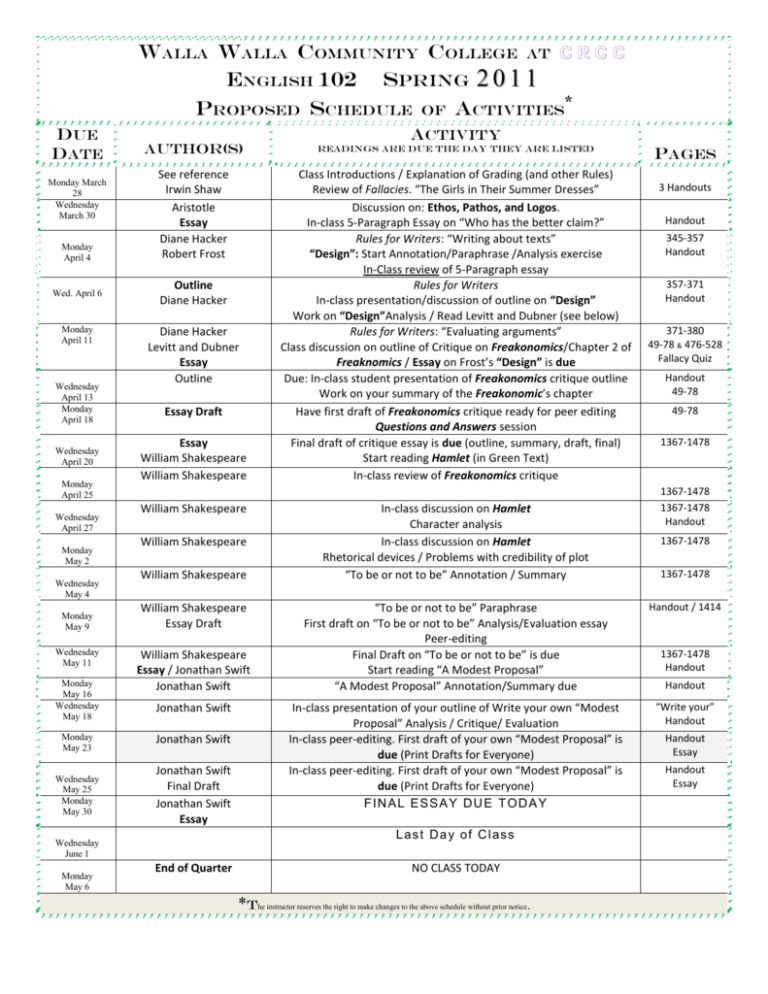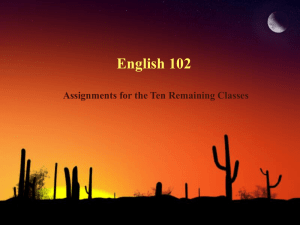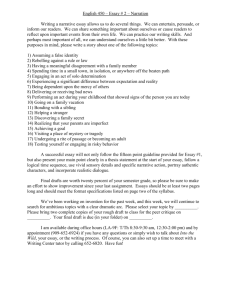View Syllabus - Walla Walla Community College
advertisement

Walla Walla Community College at C R C C English 102 Spring 2 0 1 1 Proposed Schedule of Activities* Due Date Monday March 28 Wednesday March 30 Monday April 4 Wed. April 6 Monday April 11 Wednesday April 13 Monday April 18 Wednesday April 20 Monday April 25 Wednesday April 27 Monday May 2 Wednesday May 4 Monday May 9 Wednesday May 11 Monday May 16 Wednesday May 18 Activity Author(s) Readings are due the day they are listed See reference Irwin Shaw Aristotle Essay Diane Hacker Robert Frost Class Introductions / Explanation of Grading (and other Rules) Review of Fallacies. “The Girls in Their Summer Dresses” Discussion on: Ethos, Pathos, and Logos. In-class 5-Paragraph Essay on “Who has the better claim?” Rules for Writers: “Writing about texts” “Design”: Start Annotation/Paraphrase /Analysis exercise In-Class review of 5-Paragraph essay Rules for Writers In-class presentation/discussion of outline on “Design” Work on “Design”Analysis / Read Levitt and Dubner (see below) Rules for Writers: “Evaluating arguments” Class discussion on outline of Critique on Freakonomics/Chapter 2 of Freaknomics / Essay on Frost’s “Design” is due Due: In-class student presentation of Freakonomics critique outline Work on your summary of the Freakonomic’s chapter Have first draft of Freakonomics critique ready for peer editing Questions and Answers session Final draft of critique essay is due (outline, summary, draft, final) Start reading Hamlet (in Green Text) In-class review of Freakonomics critique Outline Diane Hacker Diane Hacker Levitt and Dubner Essay Outline Essay Draft Essay William Shakespeare William Shakespeare William Shakespeare William Shakespeare William Shakespeare William Shakespeare Essay Draft William Shakespeare Essay / Jonathan Swift Jonathan Swift Jonathan Swift Monday May 23 Jonathan Swift Wednesday May 25 Monday May 30 Jonathan Swift Final Draft Jonathan Swift Essay End of Quarter 3 Handouts Handout 345-357 Handout 357-371 Handout 371-380 49-78 & 476-528 Fallacy Quiz Handout 49-78 49-78 1367-1478 1367-1478 1367-1478 Handout 1367-1478 1367-1478 “To be or not to be” Paraphrase First draft on “To be or not to be” Analysis/Evaluation essay Peer-editing Final Draft on “To be or not to be” is due Start reading “A Modest Proposal” “A Modest Proposal” Annotation/Summary due Handout / 1414 In-class presentation of your outline of Write your own “Modest Proposal” Analysis / Critique/ Evaluation In-class peer-editing. First draft of your own “Modest Proposal” is due (Print Drafts for Everyone) In-class peer-editing. First draft of your own “Modest Proposal” is due (Print Drafts for Everyone) FIN A L E S S A Y DU E T O D A Y “Write your” Handout Las t D a y of C l as s Wednesday June 1 Monday May 6 In-class discussion on Hamlet Character analysis In-class discussion on Hamlet Rhetorical devices / Problems with credibility of plot “To be or not to be” Annotation / Summary Pages NO CLASS TODAY *The instructor reserves the right to make changes to the above schedule without prior notice. 1367-1478 Handout Handout Handout Essay Handout Essay Welcome, English 102 Student: The first thing you need to know is that this is a 5-credit class and that you are expected to study an additional 2 to 3 hours for each hour you spend in class, which means that you will need 10 or more hours minimum outside of class to read and work on your assignments. If this is too much, take the class later when you can put in the time and effort necessary to learn all that this class intends to teach. If you choose to stay enrolled, then know that by doing so you enter into an agreement to become a willing participant and observer of all class requirements and rules. Know then that lecture time is not the time for interrupting the instructor or others students, but rather a time for listening, asking questions, and being respectful of others doing the same. What are you supposed to learn and be able to do in and after English 102? For one, you need to go beyond what you learned and did in English 101, which was an introduction to formal writing, the essay, and a very modest introduction to research, for which you needed to create your own MLA text, wrought with your own arguments and supported by the outside sources. In English 102 you will be asked to do the same, but in addition you will be expected to identify and avoid fallacious arguments, expand your idea of what a text is, how it works, and the various ways in which arguments can be woven into any text. English 102, for example, will ask that you to regard multiple forms of art, not just essays, as texts with their own unique forms of arguments. A song, a painting, a play, a poem, a film, even a textile or a performance, etc., can be analyzed as a text and therefore as an argument or exposition of ideas that reveals something about the work in question, the reader or spectator, and the history, society, or collective in which the phenomenon takes place. In English 102 you will be expected to build on your critical thinking ability by becoming more adept at understanding the relationship between the arguments and fallacies and what you infer were the intentions of the author or authors. Not only must you employ sound reasoning and logic in your own work, — from the sentence level to that of an entire essay — but you must also be able to identify the rhetorical tools employed in arguments comprised in the texts of others. Writing, though considered mostly an art, must be evaluated along with all forms of text, with the same keen spirit and desire for exactitude as any science, — even it is only its jouissance or subjective sense of pleasure being weighed. From art to advertisement, from civically-minded essays to political ads and election campaigns, arguments abound in a variety of forms. The goal, therefore, is that every English 102 student will be able to not only understand that which is implied and expected to be inferred and by whom, but also be able to evaluate, weigh, and analyze in written form using reason and logic. In English 102, you will examine critically (and all that it involves) a variety of texts and do the following: Annotate, paraphrase, summarize, and outline what is of importance in a text Analyze/Evaluate a variety of texts Construct your own arguments (in a credible, persuasive way using facts, statistics, and expert opinions) Put your original ideas forth in written form according to formal writing rules and formats (MLA and APA) As for the grading scale, given that the skill level of each student can vary drastically from that of the next, all students must read and re-read, write, and re-write all assignments several times in order to reach the class goals: All annotations, summaries, paraphrases, quizzes, presentations, etc. (portfolio) will account for 50 points. First in-class, 5-paragraph opinion essay (in MLA format) will account for 50 points. In-class participation, including peer-editing, will account for 100 points. Analysis essay on Robert Frost’s “Design” (MLA) will account for 100 points. The Chapter 2 of Freakonomics (in APA format) will account for 200 points. The essay on Shakespeare’s Hamlet /“To be or not to be” analysis essay will account for 200 points. The final essay on Jonathan Swift’s “A Modest Proposal” (MLA) will account for 300 points. The total is 1,000 points. There will be no late assignments, no extra-credit, and no excuses beyond medical or other facilitymandated call-outs. As for behavior, act in a manner that is conducive to learning. Work hard and have an edifying experience.






